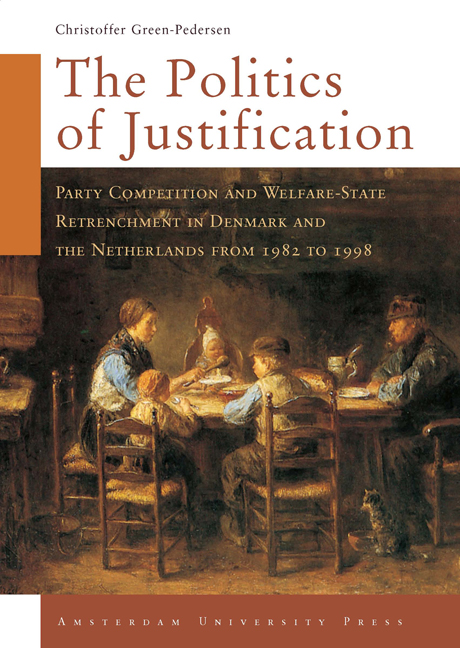 The Politics of Justification
The Politics of Justification Published online by Cambridge University Press: 15 January 2021
This chapter aims at two things. First, at briefly summarising the results of both parts of the empirical investigation. This will be done by discussing each of the six hypotheses developed in chapter 4. Second, a number of possible quibbles and alternative explanations will be discussed. Chapter 2 presented a number of theoretical propositions about variation in welfare-state retrenchment. The general aim of the research design was to be able to rule out such alternative explanations. However, this was as always only possible to some extent, leaving a number of plausible alternative explanations that deserve discussion.
The empirical support for the framework on balance
The first hypothesis was that there would be no sweeping retrenchment. Chapter 5 revealed support for this hypothesis with the qualification that defining ‘sweeping’ is difficult indeed. The underlying argument was the idea of the politics of retrenchment as one of blame avoidance. The Danish as well as the Dutch case supported this idea. In both countries, retrenchment proposals were met with demonstrations and protests. Several of the governments also experienced electoral punishment for retrenchment. However, both cases also demonstrated that governments are not necessarily punished for retrenchment.
The second of the six hypotheses suggested the implementation of more retrenchment in the Netherlands than in Denmark, based on the different systems of party competition. This hypothesis was confirmed in chapter 5 and chapter 7 showed that a consensus on retrenchment policy did in fact not emerge in Denmark until after the Social Democrats regained power in 1993. As long as they were in opposition, they had no incentive to give up their ownership of the welfare-state issue by engaging in welfare-state retrenchment. The Dutch case demonstrated how the pvda was ‘forced’ to abandon its ownership of the welfare-state issue through the 1980's to become an acceptable government partner for the cda. Thus, it does seem that the different systems of party competition can explain the variation between the two cases. However, it goes without saying that the framework cannot explain all the details in the party competition surrounding retrenchment. In the Dutch case, the framework would have, for instance, predicted the PVDA to choose a centrist course more rapidly than the party in fact did, and it is also surprising that the cda gave away part of its pivotal power when it declared the VVD its preferred government partner before the 1986 election.
To save this book to your Kindle, first ensure [email protected] is added to your Approved Personal Document E-mail List under your Personal Document Settings on the Manage Your Content and Devices page of your Amazon account. Then enter the ‘name’ part of your Kindle email address below. Find out more about saving to your Kindle.
Note you can select to save to either the @free.kindle.com or @kindle.com variations. ‘@free.kindle.com’ emails are free but can only be saved to your device when it is connected to wi-fi. ‘@kindle.com’ emails can be delivered even when you are not connected to wi-fi, but note that service fees apply.
Find out more about the Kindle Personal Document Service.
To save content items to your account, please confirm that you agree to abide by our usage policies. If this is the first time you use this feature, you will be asked to authorise Cambridge Core to connect with your account. Find out more about saving content to Dropbox.
To save content items to your account, please confirm that you agree to abide by our usage policies. If this is the first time you use this feature, you will be asked to authorise Cambridge Core to connect with your account. Find out more about saving content to Google Drive.